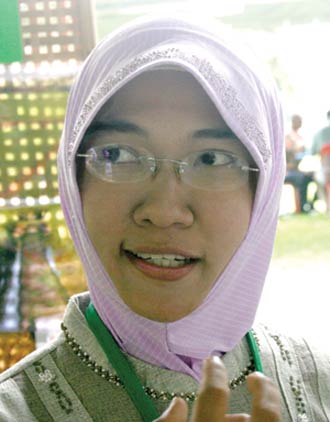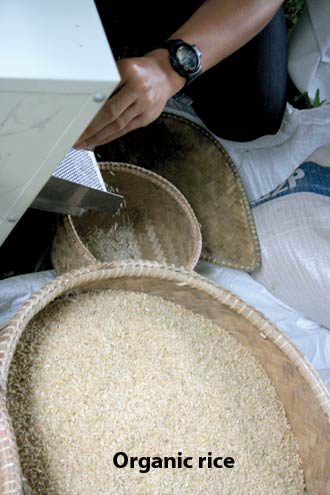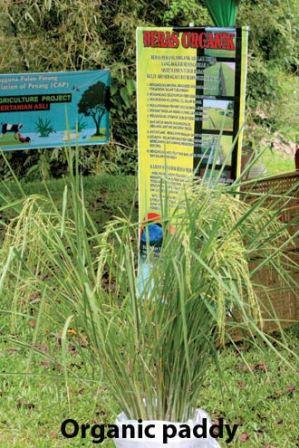A participant at the CAP Go Natural fair, Cik Salwatinisa from Tunjong, Kelantan proudly displayed a range of organic SRI rice, farmed and milled for consumption by her company, Sunnah Tani Sdn. Bhd. in Tunjong, Kelantan.
 SRI is an acronym for System of Rice Intensification, a method of rice cultivation developed and popularised in Madagascar in the 1980’s. SRI is not a standardised technological method. More importantly, it is a methodology for comprehensively managing resources — changing the way land, seeds, water, nutrients and human labour are used.
SRI is an acronym for System of Rice Intensification, a method of rice cultivation developed and popularised in Madagascar in the 1980’s. SRI is not a standardised technological method. More importantly, it is a methodology for comprehensively managing resources — changing the way land, seeds, water, nutrients and human labour are used.Organic SRI is an amalgamation of multiple beneficial practices that allow for chemical-free and sustainable farming methods to be observed. It involves,
- Preparing high-quality land
- Developing nutrient-rich and un-flooded nurseries
- Using young seedlings for early transplantation
- Transplanting the seedlings singly
- Ensuring wider spacing between seedlings
- Opting for compost or farmyard manure to synthetic fertilisers
- Utilising natural methods of pest control instead of chemical input
- Managing water carefully so that the plants’ root zones moisten, but are not continuously saturated
- Weeding frequently
The benefits of organic SRI, which have been demonstrated in over 40 countries include: increased yield (50 -100% or more), a reduction in required seed (up to 90%) and water savings (50% or more). Many organic SRI users also report a reduction in pests, diseases, grain shattering, unfilled grains and lodging. Additional health and environmental benefits stem from the reduction of agricultural chemicals, water use and methane emissions that contribute to global warming and the reduction or omission of agricultural chemicals. (SRI does not require the purchase of new seeds, the use of new high-yielding varieties, or the application of chemical inputs).
 Cik Salwatinisa who graduated in Business Studies and is now a Member of the Directors Committee for the Pertubuhan Peladang Kawasan Bachok, was not a farmer initially. She gained her affinity for organic farming when she was younger and becoming aware of her own need for healthy eating. She learned the SRI method from Mr. Aep Saipudin, an expert in organic SRI farming in Indonesia. She then returned to Kelantan to share her knowledge with other farmers who farmed conventionally. Healthy eating and living via organic farming has since become a lifestyle for her.
Cik Salwatinisa who graduated in Business Studies and is now a Member of the Directors Committee for the Pertubuhan Peladang Kawasan Bachok, was not a farmer initially. She gained her affinity for organic farming when she was younger and becoming aware of her own need for healthy eating. She learned the SRI method from Mr. Aep Saipudin, an expert in organic SRI farming in Indonesia. She then returned to Kelantan to share her knowledge with other farmers who farmed conventionally. Healthy eating and living via organic farming has since become a lifestyle for her. Cik Salwatinisa who since the year 2000, is now fully committed to nurturing her 7 acres of organic SRI paddy fields in Tunjong – now gazetted as Taman Organik Tunjong. In addition to rice, she also farms vegetables and even fish and goats there – all organically and with the assistance of 5 workers.
At her organic paddy farm, utilising organic material is a priority. Water to irrigate the farm is treated organically using plants and effective microorganisms. This is important to ensure no chemical residue from fertiliser and pesticide wash into the paddy field. Without the presence or usage of chemicals, the soil and water are rich with bacteria, insects, fish and microorganisms.
In an interview with CAP, Cik Salwatinisa explained how she successfully combined organic practices with the SRI method to produce at least 100% increase in rice yield with water usage minimised by 60%. With consideration for fellow conventional farmers, she actually limits her harvests to about 2 times a year. The first annual harvest typically yields 4 tons per acre and the second one, an increase to 5 tons per acre. Theoretically, up to 4 harvests are possible in a year.
A natural interference to her paddy farming is the presence of pests, especially the Padi Fly (Leptocorisa spp). She repels the pest with her own concoction of organic matter consisting of local herbs, garlic and galangal. Other ingredients used in different combinations as natural pest repellents are a potpourri of ground shells, coconut water, grass, shoots, chilli, lemon grass and a host of other naturally available substances. She also lets nature take its own course with the help of the natural food chain that exists in paddy fields to assist in pest management.
For fertiliser, she uses only animal and vegetable waste products. Not a single chemical fertiliser is used. Fertiliser is developed at the field using goats manure, domestic kitchen waste, grass and other materials found in the paddy fields itself.
Her decision to create the right composition and mixture of fertiliser ingredients is dependent on her perception of plant growth and health. She prefers to address issues of plant health holistically instead of micro-managing nutrient input. She remarks that with organic fertiliser, productivity is actually increased.
 Organic SRI is clearly advantageous in many ways over conventional farming, the method improves yields with no chemical inputs, with less water and less seed than most conventional methods of rice cultivation. This means that the returns on inputs are higher, making the method potentially more profitable than most of the traditional methods. It also completely eliminates the presence of synthetic chemicals, heavy metals and other toxic substances that pose a danger to our health from our rice. Cik Salwatinisa admits that organic SRI farming initially does require significantly more labour – mainly for preparing land and weeding but most SRI farmers have found that as they get to know the methods better and gain confidence in them, their pace of work speeds up, and SRI actually becomes labour saving.
Organic SRI is clearly advantageous in many ways over conventional farming, the method improves yields with no chemical inputs, with less water and less seed than most conventional methods of rice cultivation. This means that the returns on inputs are higher, making the method potentially more profitable than most of the traditional methods. It also completely eliminates the presence of synthetic chemicals, heavy metals and other toxic substances that pose a danger to our health from our rice. Cik Salwatinisa admits that organic SRI farming initially does require significantly more labour – mainly for preparing land and weeding but most SRI farmers have found that as they get to know the methods better and gain confidence in them, their pace of work speeds up, and SRI actually becomes labour saving. Cik Salwatinisa continues to actively promote organic SRI in and around Tunjong. Conventional rice farmers there are receptive but slow to accept SRI, especially organic SRI. Nevertheless, Cik Salwatinisa is determined to bring about a revolutionary change to the way we grow and eat our staple food in the interest of health and environmental conservation.
Path Alias
/articles/organic-sri-rice-indonesian-woman-talk-about-higher-yields-and-health-benefits
Post By: chandrasekharnemani
Topic
Sub Categories